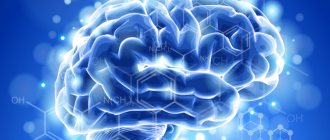From the point of view of the physiology of higher nervous activity, emotion means an urge to action.
The word is derived from the Latin verb “emovere” - I excite. In relation to emotion, the object of excitation is the cerebral cortex, which generates a mental reaction. According to the teachings of Academician Anokhin, any motivation is generated by emotion. Moreover, before the launch of a functional system, any emotion is considered negative until a positive result is achieved. If the goal turns out to be unattainable, the emotion will remain negative. When a person’s nervous system is weakened, emotional lability occurs, which is characterized by an instant reaction to any stimuli. It doesn’t matter at all what sign it is – “plus” or “minus”. An emotionally labile person reacts equally sharply to positive and negative stressors. Changes in the situation cause an instant, violent reaction. A person cries with happiness or, conversely, resentment gives rise to hysterical laughter. This is where emotional lability manifests itself, as opposed to stability. The opposite state is called rigidity in psychology, and emotional flatness in psychiatry. Lack of emotions is much more dangerous for human health. Loss of motivation leads to exhaustion faster than an explosion of emotions.
Disorders of an emotionally unstable personality are characterized by impulsiveness, spontaneity of actions in the absence of self-control and without taking into account possible consequences. At the same time, affective outbursts arise for insignificant reasons. In psychiatry, borderline states include emotional lability, the symptoms of which manifest themselves depending on the personality type. There are two types of emotional weakness:
When the emotional sphere is disordered according to the impulsive type, a persistent state of dysphoria develops, that is, an angry-sad mood, interspersed with outbursts of anger. People who have emotional lability are difficult to get along with in teams because they always claim leadership without taking into account their own abilities. In family life, excitable individuals express dissatisfaction with daily worries, considering them routine and not worthy of attention. Therefore, conflicts often arise, accompanied by breaking dishes and the use of physical violence against family members. The person is unyielding, vengeful, and vindictive. In the absence of progression, emotional lability smoothes out with age, and by the age of 30-40, easily excitable men calm down and “gain life experience.” For women, as a rule, violent emotional outbursts become a thing of the past after the birth of children. This is due to changes in hormonal levels during pregnancy.
Under unfavorable conditions, patients lead chaotic lives and often resort to drinking alcohol, which leads to the commission of aggressive antisocial acts.
The borderline type of personality disorder is characterized by increased impressionability, vivid imagination, and increased enthusiasm. Such emotional lability gives rise to workaholics. People with borderline emotional disorder are easily influenced by others. They easily and gladly adopt “bad habits” and norms of behavior that are not encouraged by society. Borderline individuals go from one extreme to another, so they often break off marriages, quit their jobs, and change their place of residence.
Society has an accepted point of view that capricious children are the result of poor upbringing. This is true, but only partly. There is a relationship between lack of attention and the development of neurasthenia syndrome in a child. Persistent emotional lability in children leads to nervous exhaustion, which, in turn, intensifies the mental reaction. The baby requires increased attention, so he makes “scenes.” This is characteristic of hysterical personality development. People with such a psychotype are, as they say, difficult to please. Strict upbringing gives rise to protest, increasing emotional lability; indulging in any whims leads to similar results.
If, from the point of view of others, the child is not deprived of attention, the reason for the heightened perception of changes in the environment should be regarded as the development of neurosis. Neurotic disorder, in turn, is subject to treatment.
The causes of neurotic conditions are traumatic situations. When the cause is eliminated, emotional lability disappears - treatment by a psychiatrist guarantees positive results if treated in a timely manner. It is necessary to pay attention to the child from a young age. Manifestations of negativism - denial of adult demands - should alert parents.
When emotional lability develops in old age, treatment drugs are aimed at improving blood circulation in the brain. If nervous excitability is caused by organic lesions of the nervous system, emotional lability also appears, the treatment of which consists of combating the underlying disease. This is the work of neurosurgeons and neuropathologists.
Nootropic drugs sold without prescriptions are indicated for all types of emotional instability. Herbal sedatives have a good effect.
There is a big difference between conventional wisdom and medical diagnoses. Especially when emotional lability develops, drugs for the treatment of which should be taken only on the recommendation of a psychiatrist. The help of a psychologist, of course, has a positive effect, but does not eliminate the causes of mental disorders.
Video from YouTube on the topic of the article:
What is nervous system exhaustion?
Depletion of the central nervous system consists of many similar terms and synonyms that mean the same thing. This diagnosis is made a little differently, because... This is a more common name, but it is still very common. This disease is very widespread, since it belongs to neurotic forms of pathology. It is especially widespread in countries of the developed world, which is associated with the type and level of loads. Countries that are not so developed are more susceptible to pathologies of infectious origin and do not suffer from neurotic exhaustion.
According to statistical indicators, exhaustion of the nervous system affects about a quarter of the population of countries with developed economies and is growing progressively with a downward trend. There is evidence of an increase in neuroses (including nervous exhaustion) by more than 20 times over the last hundred years.
The non-specificity of symptomatic manifestations usually pushes individuals to turn to non-specialized doctors, which complicates the diagnosis. Depletion of the central nervous system should be detected by family clinics and referred to a neurologist. The ease of manifestations of pathology is very doubtful due to the significant impact on all areas of life with the subsequent exclusion of many possibilities. The individual becomes exhausted and endures constant, overwhelming loads.
According to the ICD 10 classification, depletion of the nervous system is called neurasthenia and is classified in the subsection of disorders of the nature of spectral neuroses. The nervous system exhaustion number is F 48 and is clearly defined by diagnostic criteria.
Depletion of the central nervous system has psychogenic roots and is determined by K. Jaspers criteria for neurotic disorders. These pathologies have been known for a long time, but this does not negate their spread and influence. According to the classification, neurotic exhaustion is a pathology of chronic discharge and lasts from 3 months. Neurasthenia has its own peculiarity; it lies in the fact that the individual forgets the psychological trauma that provokes the disorder, and this poses some difficulty in diagnosis.
Modern society pushes the individual to work hard, since it is important to earn in order to consume. The idea of slowing down and taking a break rarely comes to mind and everyone tries to drive it away, realizing that in the modern world to stop means to die. It is precisely this organization of society that pushes towards such an increase in psychogenic pathologies. No one has time to be themselves, trying to cover as much activity as possible.
Depletion of the nervous system in a child is also called asthenic neurosis. This pathological condition is based on overload of the central nervous system. It can have a considerable number of genesis, but the most common is mental. This pathology does not select gender and affects both women and men equally regularly, preventing them from achieving self-realization and living happily.
Clinical and laboratory diagnostics
This disease can be diagnosed only after an examination to exclude organic pathology in physiological manifestations and mental illness in neuropsychological disorders.
After the examination is completed, autonomic disorders are considered.
Often their manifestation is noticeable even when interviewing the patient and a superficial examination - this is dilation or constriction of the pupils, dry skin or excessive sweating, possible pallor or, conversely, sharp hyperemia of the skin.
The tone of the autonomic system is judged by reflexes. Somato-vegetative, skin and sweat reflexes are usually examined.
Recently, to study the function of the nervous system, they began to use biochemical tests of blood and urine along with a number of instrumental studies. All this allows us to assess the degree of disturbance and severity of the vegetative form.
Causes of nervous system exhaustion
The etiopathogenesis of nervous system depletion has many roots, which is associated with the nonspecificity of the pathology. The basis still remains the lack of important things and deprivations, for example, the inability to recognize and express one’s needs.
Exhaustion of the nervous system in a child can develop due to the inability to express emotions or their non-acceptance by parents. This can be formed when parents do not welcome emotionality, which over time displaces the emotional response, leading to deep-seated frustration. In this situation, a certain pathological form of reaction is formed. Exhaustion of the nervous system in a child may be preceded by frustration - the perception of what has not been achieved as an insurmountable obstacle.
Pathophysiological mechanisms manifest themselves in a malfunction of the nervous system functioning, like a short circuit. But rapid recovery does not occur due to premorbid factors and readiness for exhaustion. The presence of organic lesions is also relevant, which aggravate the manifestations and complicate relief. A possible etiology is a change in the cortical-limbic complex in the brain.
Psychotrauma is a prerequisite for neurotic exhaustion, and its relevance can only be determined by the suffering individual himself, so it should not be questioned. At the same time, its content may be forgotten by the person himself, but its effect manifests itself from the subconscious.
Exhaustion of the nervous system in a child directly correlates with the strength of the nervous system. The relationship is inverse, in terms of - the greater the strength, the less the risk of developing psychological trauma. Constitutional aspects that are formed congenitally also play an important role, since they affect the speed and strength of nervous processes.
Somatic and organic factors play an important role in the causes, if present. Somatic pathologies, especially those affecting the central nervous system, become a trigger for the formation of exhaustion. Nurturing personal qualities can also contribute to the development of exhaustion of the nervous system, especially when it is overprotection that puts pressure on the child. Accentuations, as manifestations of neurotic disorders, which are formed both genetically and in the process of education, can also play to the detriment of the individual, further weakening the central nervous system.
Factors that shape the exhaustion of the nervous system are divided according to group affiliation. The form of attrition depends on the group it belongs to. Biological factors are formed based on genetics. These are certain hereditary tendencies and constitutional features; this group includes diseases that existed. Gender is not so relevant, since the disease regularly affects everyone, perhaps differing only in certain manifestations. The age is closer to young, although there is a tendency and vice versa. The stresses of pregnancy also have these consequences, as well as birth complications.
Psychological aspects have an impact on the depletion of the nervous system, since they form a certain pathological behavioral pattern, which pushes the individual towards neurotic disorders.
Determination of vegetative lability
The functioning of our internal organs, circulatory and lymphatic systems completely depends on how correctly and accurately the autonomic, or, as it is sometimes called, the autonomic nervous system functions. It is also responsible for the functioning of various glands in our body. Heartbeat, increase or decrease in blood pressure, sweating - all this is directly dependent on the autonomic nervous system.
It is very important when perceiving different signals in critical situations, when a person is very worried or under stress.
The quality of sleep, the digestion of food, the ability to relax physically and psychologically - all this is subject to the same system.
Symptoms of nervous system exhaustion
The criteria for nervous system exhaustion are important because they allow easy diagnosis and the exclusion of complications. Almost continuous weakness, accompanied by fatigue, inappropriate to the level of stress. Usually what leads to exhaustion is not massive joys/sorrows, but the accumulation of minimal problems that still have an impact, continuously accumulating. The environment significantly drains the individual, since defense mechanisms are reduced for some reason. Life in a full-fledged society is significantly stressful, taking away opportunities for adaptation; patients avoid the slightest social interactions.
Signs of exhaustion of the nervous system are severe irritation and avoidance of the environment. People direct their irritability into themselves, trying to suppress it, which is a kind of auto-aggression. Social connections are gradually lost, since communication is invariably annoying and tiring.
Signs of exhaustion of the nervous system appear both from the body and somatics, since the sympathetic system is activated during exhaustion. Such individuals complain of manifestations of algia, that is, pain manifestations of various origins. Myalgia manifested in the muscles, gastralgia in the stomach, migraine-like pain, neuralgia.
Another sign of exhaustion of the nervous system is insomnia or feelings of weakness and lack of sleep, which lead to a chronic feeling of fatigue. This may include intermittent waking up at night, inability to fall asleep and earlier waking up. The feeling of sleeplessness in an individual who has slept all night is very characteristic of nervous exhaustion. In this case, the condition is accompanied by weakness and exhaustion, and a reluctance to do anything. It is important for making a diagnosis the presence of certain psychogenic factors, for example, instability in the family.
Low mood, lethargy, passive submission are also very characteristic. There may be irritability, short temper, even aggressive impulses. Characterized by forgetfulness, passivity in business, and inability to concentrate. Aggressive manifestations are very often exhausting and depleting. Sometimes noise, light and everything around is annoying. Moreover, this brings the greatest discomfort to the family circle, since they cannot help in any way.
Due to the presence and addition of obsessive tendencies, an individual is able to think about certain thoughts for a long time or worry about some minor reason. This greatly knocks him out of the mainstream of existence, forcing him to lose his usual skills. In general, cognitive abilities decrease, and sometimes even the impression of laziness is created. They also usually become touchy and whiny, and there are no objective reasons for this.
Signs of exhaustion of the nervous system affect all systems of the individual, in particular, immune defense decreases, which aggravates already obvious pathologies and facilitates the addition of a new range of viruses and other small pests. At the same time, long-standing diseases can also worsen. The central nervous system, as well as the heart muscle, is most affected; this is due to the activation of stress hormones and an overabundance of heart function. The gastrointestinal tract also suffers, which is associated with stress levels of hormone release and deteriorating nutrition.
Drugs for the treatment of disorders
Drug treatment of autonomic lability is aimed at normalizing the function of organs and systems and relieving tension in the autonomic nervous system. They use medications to normalize sleep, safe sedatives, painkillers, and also use vitamin therapy.
For severe disorders, anti-anxiety medications may be prescribed for a short time:
The basis of the disease is a disruption of the autonomic system.
Ignoring symptoms can lead to serious psycho-physical complications.
In advanced forms, pathologies of systems and organs may develop, such as ischemia, hypertension, various types of gastritis, and peptic ulcers. Various anxiety conditions can lead to mental disorders.
Recommended preventative methods
You can prevent disruptions in the functioning of the autonomic nervous system by following simple recommendations.
- Lifestyle. Changes should be made to the daily work schedule. Spend more time in the fresh air, alternate rest with work, it is advisable to avoid stress, give up bad habits.
It is advisable to distance yourself from the influence of negative emotions and tune in to the positive. Communicate more with people, attend cultural events.
- Proper nutrition. It is recommended to follow a diet. Eat more easily digestible, healthy foods: vegetables, fruits, dietary meat, dairy products, seafood, lettuce, spinach, nuts, grains, vegetable oils.
It is advisable to avoid eating baked goods, sweets, fatty and fried foods, soda, chewing gum, and strong tea or coffee. You can drink green tea and pure still water.
- Physical activity. Exercising helps saturate the body with air, strengthen the cardiovascular system, and increase immunity. Any sport is suitable for this: swimming, aerobics, running, cycling, race walking, dancing.
- Massage, acupuncture, swimming, yoga, contrast shower, relaxing bath, aromatherapy, bath are effective.
- Healthy sleep. During a night's rest, all the body's functional abilities, vitality and energy are restored.
Doctor: Olga Shishkina ✓ Article checked by doctor
Nutrition for vegetative lability
The health of nerve cells depends on the usefulness of food.
For their normal operation, it is necessary to consume products with a high concentration of certain chemical elements:
- Phosphorus activates the functioning of nerve endings. It is found in legumes, liver, cereals, and dairy products.
- Iron is responsible for brain function. Its sources are seafood, liver, beef, buckwheat, spinach, cabbage.
- Calcium ensures the speed of transmission of nerve impulses to internal organs and systems. Calcium is found in dairy products, vegetables, and almonds.
- Magnesium is responsible for the transmission of nerve impulses. It enters the body through consumption of all types of cereals, nuts, egg yolk, and bran.
- Potassium normalizes the functioning of the cardiovascular system. It is advisable to include vegetables, fruits, legumes, and millet in the daily menu.
- Promotes normal functioning of the thyroid gland, improves memory iodine. It is found in seaweed and seafood.
- The daily menu should include foods that contain vitamins A, B, C, E. The main sources of vitamins are: legumes, nuts, vegetables, fruits, fish oil, citrus fruits, red peppers, rose hips, strawberries, black currants, spinach, sprouted wheat sprouts, porridge, black bread.
- All types of cereals and cereals play an important role in the health of the nervous system. They are the main source of fiber, which is able to remove accumulated toxins from the body.
- To form liquid cholesterol, you need to consume foods that contain lecithin: eggs, sunflower seeds, citrus fruits, sprouted wheat. Cholesterol in this form is necessary for nerve cells.
- Brain activity depends on blood glucose levels. To normalize it, it is advisable to eat potatoes, grapes, salads, fruits, raspberries, raisins, and honey.







